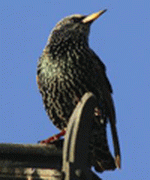Making a clean getaway: Scientists demonstrate how bird baths make for more accurate flyers

(PhysOrg.com) -- Newcastle University scientists investigating why starlings bathe so often have discovered it alters their escape behaviour, with clean birds proving the most accurate flyers.
When sent through an aerial obstacle course, birds that had bathed were slow but accurate, whilst birds that hadn’t were faster but suffered more collisions.
Writing in the journal Animal Behaviour, the team suggests this is because a bird’s sense of anxiety may be linked to its bathing regime - with unwashed birds the most likely to get into a flap.
Newcastle University’s Dr Ben Brilot and colleagues carried out the study after observing that captive birds often bathed after sessions in which they had been caught and handled, suggesting that bathing may help to realign feathers that have been damaged or disordered.
They set up a series of experiments to test this, where birds’ escape responses were measured after being handled and then being given access to either full or empty bird baths.
Each bird was startled into an escape response by a loud bang played as its cage was opened, and flight performance was assessed by means of an aerial obstacle course comprising 38 weighted strings hanging from the ceiling.
European starlings that had been given access to bathing water just prior to the test flew more accurately through the obstacle course, hitting fewer strings than birds that were denied a bathing opportunity.
Whilst avoiding more strings, birds that had bathed flew more slowly through the course, explained Dr Brilot.
“These differences may reflect differences in the way that birds perceive risk in the environment. Birds that can bathe may have greater manoeuvrability, hence worry less about escaping as fast as possible, and choose instead to avoid damaging themselves in collisions with the obstacles.
“Non-bathers, on the other hand, may have perceived a greater threat in their release conditions, both from the noise and presence of humans, and therefore chose to escape as fast as possible, weighing the risk of collision as less important than the need to escape.”
The researchers suggest that lack of bathing may increase anxiety in captive birds due to their compromised ability to escape from potential danger, and that this anxiety produces the speed-accuracy trade-off.
Dr Louise Barrett, Executive Editor of Animal Behaviour, commented: “As well as helping us to understand the function of bathing, Brilot and colleagues’ findings have major welfare implications. Making sure that captive birds can bathe regularly and freely may avoid the undue stress that poor feather condition might cause them.
“Bathing could therefore be essential not only for their physical health, but also for their mental health.”
More information: Water bathing alters the speed-accuracy trade-off of escape flights in European starlings. Ben O.Brilot, Lucy Asher and Melissa Bateson; Published in: Animal Behaviour, doi:10.1016/j.anbehav.2009.07.022
Provided by Newcastle University















